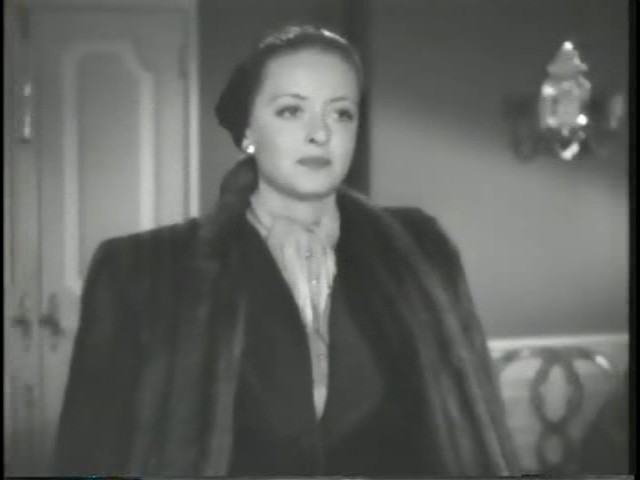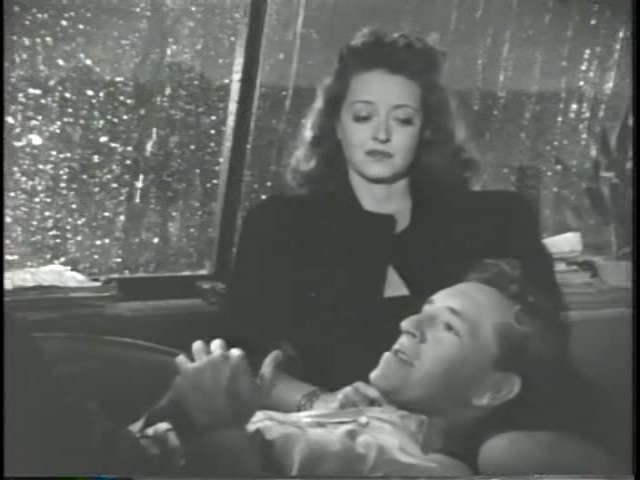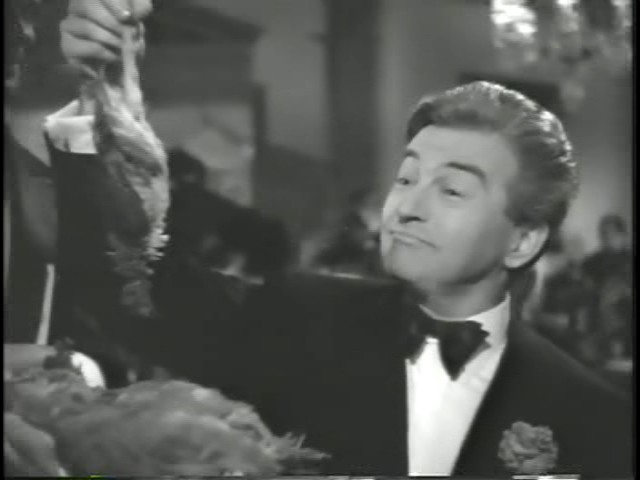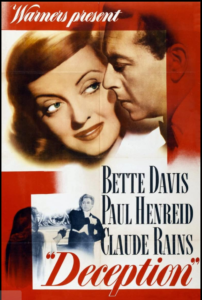Deception (1946)
[Note: The following review is of a non-Guide for the Film Fanatic title; click here to read more.]
“Sooner or later you’ll come back to your old teacher. You’ll realize that nothing matters except music; everything passes, except music — and me.”
|
Synopsis: |
Genres, Themes, Actors, and Directors:
- Bette Davis Films
- Claude Rains Films
- Composers
- Irving Rapper Films
- Jealousy
- Love Triangle
- Musicians
- Play Adaptation
Review:
Based on Louis Verneuil’s 1928 play Jealousy, this atmospheric melodrama (directed by Irving Rapper) received negative reviews upon its release, and is generally considered to be merely an “operatic rehash” of its source material — an assessment which doesn’t do this enjoyable film justice. The three leads (who starred together in Rapper’s earlier Now, Voyager) are all wonderful, with Bette Davis perfectly cast as the duplicitous yet well-meaning Christine, and Paul Heinreid appropriately handsome and moody as Karel. Yet it’s third-billed Claude Rains who most impresses: his portrayal of the egomaniacal Hollenius contains intriguing hints of closeted homosexuality, making his obsessive “love” for Christine seem more like a desire for control than a manifestation of lust or romance. Indeed, music itself is the true love interest in this sticky triangle, with murder eventually committed in its name; and while the film’s violent denouement seems to come out of nowhere, it’s fairly easy to forgive this melodramatic plot device considering the clever script that’s come before.
P.S. Interestingly (but perhaps not surprisingly), Christine’s own musical ambitions are dropped as soon as Heinreid appears on the scene; she’s relegated to performing for guests at her own wedding celebration.
Redeeming Qualities and Moments:
- Claude Rains as Hollenius

- Bette Davis as Christine

- Paul Henreid as Karel

- John Abbott in a bit role as a cellist

- Atmospheric settings and backdrops

- Hollenius taking his sweet time ordering a fancy dinner at a restaurant

- Clever dialogue: “Extraordinary, isn’t it, that music can exist in the same world as the basest treachery and ingratitude?”
- Erich Korngold’s score
Must See?
Yes, simply for Rains’s performance.
Categories
- Noteworthy Performance(s)
Links:

One thought on “Deception (1946)”
A must – not just for Rains’ performance; for the whole darned film!
This is a film truly unique in film history – one which, to this day, gets shamefully little attention. As mentioned in the terrific DVD commentary by film historian Foster Hirsch, ‘Deception’ is an amalgam of film noir, woman’s picture and psychological drama. As such, audiences at the time of its release apparently didn’t know what to make of it. Subsequently, it flopped.
Often sign of a film’s genius.
Here is a ’40s pic which – in spite of/because of existing problems with the Hays Office – went places rarely covered during the period. Not only went there, but with first-class treatment! Check out that consistently cavernous production design, along with Ernest Haller’s thesis-worthy photography. This is a movie that drips to overflowing with angst-ridden subtext. (Note, for example of what’s barely spoken, Henreid’s implication early on that Davis has become a prostitute to ‘make ends meet’.)
Here is a film which, flying in the face of the period, gives you no one to really root for.
It’s all marvelously tense and, simultaneously, deliciously hilarious. But don’t misunderstand: I’m not calling this camp, even if it sometimes dangerously points in that direction. It’s all taken, respectfully, seriously. It’s just that sometimes it can’t help itself – given the territory – and, if laughter comes, it’s the laughter of recognition: neurotic/artistic types ARE this way.
I was tempted to quote from the film, but I’d’ve never stopped. This movie has the kind of verbal richness that more-than-rewards on repeat viewings.
It might be particular fun – for the dynamics – to watch this film right after seeing Davis, Rains and Henreid in ‘Now, Voyager’ (also directed by Irving Rapper). It would certainly be a case of full-tilt boogie.
Of particular ‘note’: original music by the renowned Erich Wolfgang Korngold. The music in this film soars – making it, throughout, easy to comprehend what the three leads ‘do for love’.